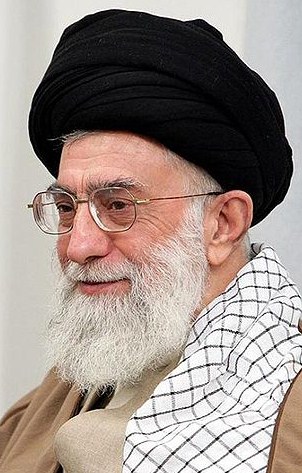UPDATES
Iranian Supreme Leader Ayatollah Ali Khamenei’s mission “To set Israel on fire”
February 5, 2013 | Talia Katz

The principle argument being made by opponents of strong action against Iran’s nuclear program is that Iran is a “rational” actor, whose regime values survival above all else and a nuclear Iran can be contained just as the Soviet Union was during the Cold War.
Now a new report offers yet more evidence to doubt whether Iran’s “rationality” is so obvious and assured. And the report concerns not the loud-mouthed Iranian President Mahmoud Ahmadinejad, but the man everyone agrees has ultimate control over Iran’s nuclear program, Supreme Leader Ayatollah Ali Khamenei.
Reportedly, Spain’s former national security adviser, Rafael Bardaji, told a conference last week that Ayatollah Khamenei told a Spanish delegation in 2001 that his primary job “is to set Israel on fire.”
Then Spanish Prime Minister Jose Maria Aznar and Bardaji attended the meeting as part of a official Spanish delegation which visited Teheran in 2001. According to Bardaji, during the meeting, the Spanish delegation opened proceedings by asking Khamenei to explain his role in Iran’s government.
“My job is to set Israel on fire,” Khamenei replied, according to Bardaji.
According to reports, Bardaji told the story of the 2001 meeting at a conference titled ‘Iran and the International Community: Policy Considerations for 2013′, sponsored jointly by the Henry Jackson Society (HJS) and the Foundation for Defence of Democracies (FDD) on 30 January 2013.
HJS Executive Director Alan Mendoza moderated the panel, which included Bardaji and Elliott Abrams, who served as national security adviser to former US President George W Bush.
“Having breakfast with the Supreme Leader of Iran is not something many people can boast of. But the account of just such an occasion by Rafael Bardaji-former national security advisor to the Spanish Prime Minister-stood out as a highlight of the HJS Iran conference in Westminster,” Mendoza wrote in an HSJ editorial newsletter on Feb. 1.
In a blog post published on the Council of Foreign Relations website, Abrams wrote : “As we think through the likelihood of arriving at a good negotiated solution with Iran, and the possibility of persuading and pressuring the Supreme Leader to abandon his nuclear weapons program, it is worth keeping this rare encounter with him by a Western democratic leader very much in mind.”
Aznar has gone public with revelations about the 2001 meeting in the past, but Bardaji has added some new details as well as corroboration. See here for a previous AIJAC post on the issue. In a 2012 Times of Israel report, Aznar spoke about the tone of the meeting.
“Israel to him was a kind of historical cancer and anomaly, a country … condemned to disappear,” Aznar said. “At some point he said very clearly, though softly as he spoke, that an open confrontation against the US and Israel was inevitable, and that he was working for Iran to prevail in such a confrontation. It was his duty as the ultimate stalwart of the Islamic global revolution.”
Despite such repeated revelations, many Australian analysts keep insisting that Iran is rational and can be contained.
Australian former Foreign Minister Gareth Evans makes the mistake of equivalence, warning that Iran “is an extraordinarily complex country,” and that “we also fail at our peril to comprehend the currents of restraint and good sense that run within the country, including at high policymaking levels.”
Evans was not alone in this analysis. Harry White made the case that Iran is a manageable problem while Gwynne Dyer argued that Iran is ” a lot more rational than their Western counterparts – or at least than their Western counterparts can afford to seem in public.” Paul McGeough of the Sydney Morning Herald approvingly quoted Paul Pillar, a former CIA analyst, who argued that any view that Iran’s leaders “cannot be counted on to act rationally… was at odds with more than 30 years of history that demonstrated Iran’s rulers were overwhelmingly concerned with preserving their power.”
While numerous writers have countered these arguments for sanguine acceptance of a nuclear Iran – see Emanuele Ottolenghi in the Sydney Morning Herald last year, and Peter Khalil, Michael Danby and Carl Ungerer in the Australian – those arguing for containment appear unfazed.
They dismiss all the wild Iranian talk about destroying Israel as just rhetorical posturing for political purposes, and, when it is Ahmadinejad speaking, often make the irrelevant point that he is not in charge of the nuclear program, Khamenei is. But Khamenei has repeatedly threatened to destroy Israel (see also here). Moreover, in the case revealed by Bardaji and Aznar he volunteered his sentiments in response to an innocuous question at a private meeting with a foreign delegation when there was no conceivable political or diplomatic benefit from engaging in posturing about Israel.
Khamenei’s point appears clear – his life’s mission is the destruction of Israel. Those who insist Iran can be contained now need to answer two questions: How can you be so sure we can trust that he will behave “rationally” when he gets his hands on nuclear weapons, and thus the ability to carry out this self-confessed grand design? And are you prepared to risk a nuclear war and the likely deaths of millions of people if you are wrong?
Talia Katz
Tags: Australasia





